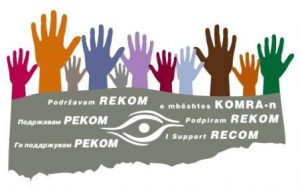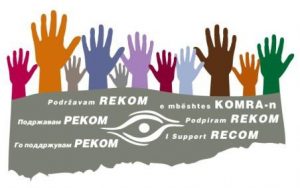
14.12.2016.
Support for the establishment of RECOM: documenting war victims and detention sites [announcement]
Establishment of RECOM
On December 15th, 2016, 11 a.m. at the Belgrade Media Center, the RECOM Coalition will mark International Human Rights Day and offer a presentation on its research into the human losses and detention sites during the wars in the former Yugoslavia.
Speakers:
Nataša Kandić, RECOM Project Coordinator
Slaven Rašković, Documenta, Croatia
Dženana Karup Druško, Association for Transitional Justice, Accountability and Remembrance in B&H
Bekim Blakaj, Humanitarian Law Center Kosovo
Support for the establishment of RECOM: documenting war victims and detention sites
During the course of 2016, the RECOM Coalition has made significant progress in documenting the individual war victims and wartime detention sites that operated in the former Yugoslavia from 1991 until 1999, thus contributing directly to the prospects for the establishment of an official regional commission to establish the facts about the war crimes and the circumstances under which more than 130,000 people lost their lives in connection with the wars fought in the former Yugoslavia. The NGOs Documenta, the Humanitarian Law Center, the Humanitarian Law Center Kosovo, the Association for Transitional Justice Accountability and Remembrance in B&H and the Center for Democracy and Transitional Justice have already established the identities and the circumstances of death of around 22,000 war victims, and have documented 600 detention sites and camps where at least 150,000 people, B&H nationals for the most part, were imprisoned during the war. The Hague Tribunal has also established the identities of around 12,000 victims of war crimes. The facts have shown unequivocally that the ongoing process of facing the past requires the relevant state institutions to engage directly in order to put in place guarantees and safeguards against the repetition of war crimes in the future. With the help of civil society and its expertise, the regional commission can accomplish its tasks of creating a registry of war victims and documenting all the war crimes, and thus finally put an end to the Balkan practice of remembering victims just as numbers, rather than as actual human beings with first and last names.
Throughout the wars of the nineties, it was the civilians who were treated as the main enemies and opponents. Around 70,000 civilians and 60,000 members of the various armed forces lost their lives in these wars, while approximately 10,000 war victims still lie buried in unmarked graves. RECOM can provide help in discovering still-unknown mass graves, and has the potential to contribute to the affirmation of empathy and other forms of personal and societal investment in reconciliation.
The Berlin Process also includes a programme which deals with RECOM’s goals and tasks relating to the establishment of facts about war crimes, the naming of victims and the acknowledgment of their dignity and equal status. The first step towards reconciliation has already been made with the establishment of its Regional Youth Office. The adoption of the Declaration on the Establishment of RECOM would be the logical next step.
A live English translation will be provided.














